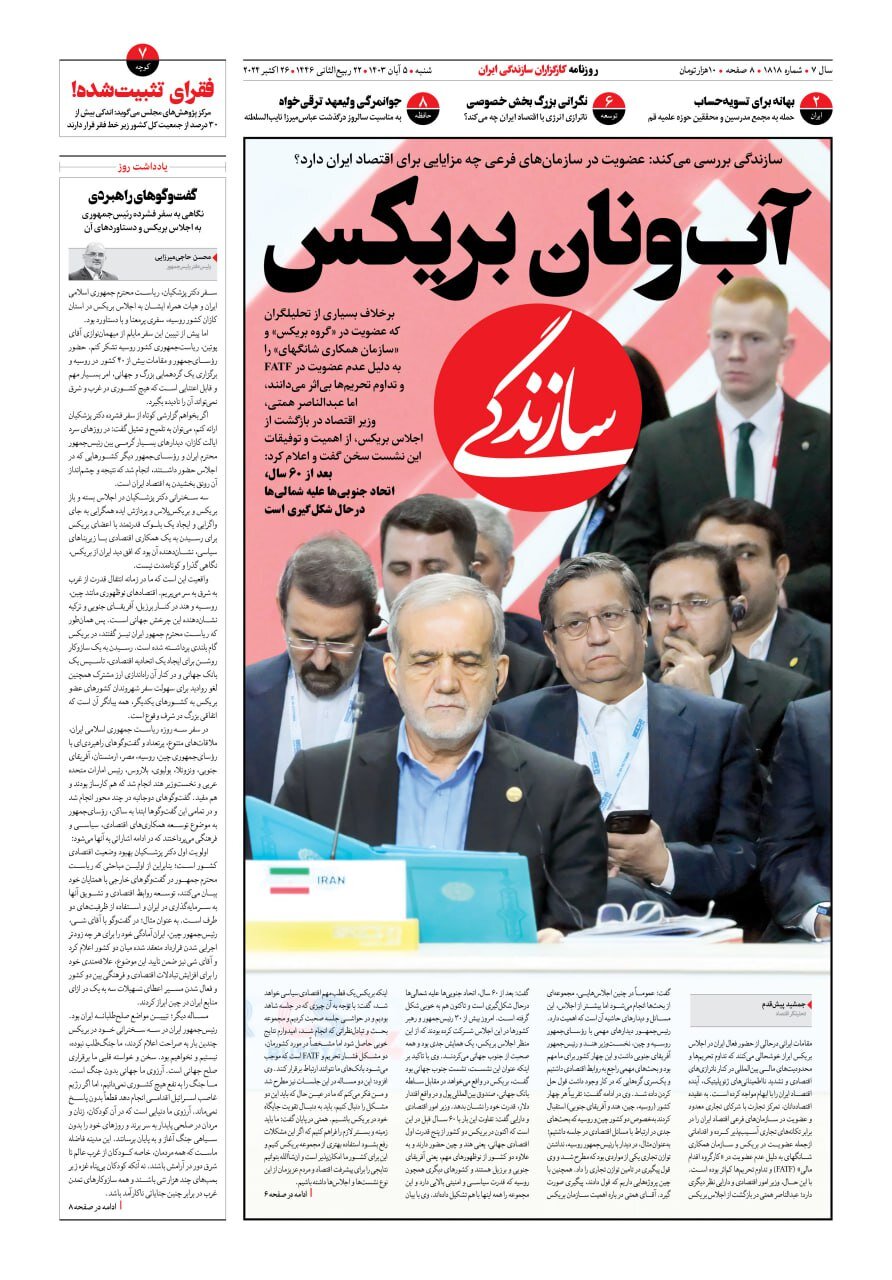Iran's important presence in BRICS

TEHRAN - In a commentary, Sazandegi dealt with the importance of Iran's membership in BRICS in the current situation and wrote: BRICS is considered a pact among emerging economic powers.
The members can form a powerful bloc in the face of the West. The analysis of the presidents of China, Russia, and even Indians is that the transfer of power from the West to the East is inevitable. Iran's presence at the (Kazan) summit was and is important from several aspects. First, because of regional developments and Israel's bellicosity. Israel attempts to drag Iran into a war. Naturally, Mr. Pezeshkian will use the capacity of the Kazan summit to counter Israel. Secondly, Iran is trying to use the economic capacity of emerging economic countries such as Brazil, India, and of course, China to evade sanctions or neutralize them. Of course, it is a difficult path, because each of these countries has extensive economic relations with the United States, and it is unlikely that they would abandon those interests. However, Russia, considered an important member of BRICS, is trying to form a financial bloc against the West.
Arman-e-Emrooz: Israel's hidden war against Iran
In an interview with Abdolreza Faraji Rad, an expert on political affairs, Arman-e-Emrooz examined Israel's hidden war with Iran. He said: Evidence shows that the time of Israel's military adventure against Iran is near. [However, Israel launched limited attacks on some military sites in the provinces of Tehran, Khuzestan, and Ilam in the early hours of Saturday). For this reason, it is possible to point out the regional trip of American Secretary of State Blinken, especially to Israel, where he went to check the magnitude and time of Israel's attack. Blinken's trip to Israel and then to Saudi Arabia and Qatar also has a diplomatic dimension, and it is probably related to an initiative for the next action against Iran. Usually, America adopts a diplomatic strategy in such sensitive times to prevent the situation from getting out of control. All the tricks of the last few days are about attacking Iran to create panic and disrupt the Iranian economy by increasing the prices of gold, foreign currency, and raising the inflation rate, which unfortunately succeeded. Israel is pushing the Iranian government toward poverty and a high inflation rate and launching a hidden psychological war by spreading rumors about a plan (by the government) to increase petrol prices.
Kayhan: Increasing psyops by the enemy
In a note, Kayhan discussed the Zionist regime's threats against Iran and said: The Zionist regime's threat of military action against Iran is more of a psychological operation than it is based on facts. Upon daily threat of immediate operations against Iran, the Zionists launched a significant psychological operation by repeating threats with the help of their media. Their effort is to keep Iran passive and away from the developments in the battlefields (in Gaza and Lebanon). They think that in this way they can keep the Iranian authorities busy with purely defensive concerns and prevent them from playing a special role in the regional war. Certainly, the Zionists have analyzed different scenarios in these few weeks, and each time they have become more certain that this time Iran's response to any military mistake by the Zionists could be more destructive, painful, and irreparable. Therefore, they want to drag the war to the media and launch psychological and economic war against Iran under the cover of military threats.
Javan: Iran neither surrenders nor seeks tension
Javan wrote in an article: It seems that the current asymmetrical warfare and occasional calculated attacks between Iran and Israel will continue. Thanks to its committed forces in Lebanon, Iran is practically at war with Israel. Iran has long been proud of the advantages of its access to the Mediterranean, the Persian Gulf, and the Red Sea. But Tehran is diplomatically trying to assure the world that it is not looking for the escalation of tensions. Iran or Israel could do an act that is difficult to reverse. They may drag the entire region into war. That war does not help the long-term security of Israel and does not benefit the Iranian government; therefore, the option of a full-scale war between Iran and Israel is not on the table. Once again, Iran has proven that it can withstand any possible blow and respond strongly through the forces it supports. The region and the world are afraid of the worst wars going on in Gaza and Lebanon. But a wider conflict that directly puts Iran against Israel is a serious matter. Everyone in the region hopes that this will not become a reality.
